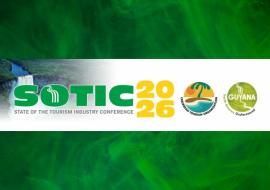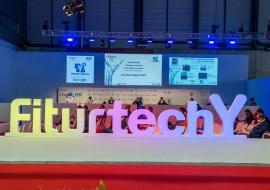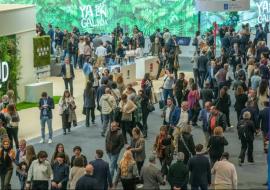Smart Tourism: AI and Future Technology Transforming the Travel Industry

As part of the agenda for the Americas Tourism Summit 2024, the panel Smart Tourism: AI and Future Technology took place this Tuesday, featuring experts such as Juan Miguel Moreno, Tourism Innovation Specialist; Patty Yunen Latour, Vice President of Sales for Northern Cone, Growth-Google, LATAM; Alejandro Mullor Sarsa, Worldwide Lead Tourism at Microsoft Europe; Jimmy Pons, Tourism Innovation Specialist and Founder of FIRTUEX; and Javier Sirvent, Artificial Intelligence Specialist. The discussion focused on how these tools are shaping the present and future of the tourism industry.
The Impact of Technological Disruptions on Tourism
One of the topics addressed was an exploration of the major evolutionary disruptions that have changed human history, culminating in artificial intelligence as the "fifth disruption." It was highlighted that AI has transformed entire sectors at an unprecedented pace, and tourism is no exception. The experts provided examples such as applications that allow users to explore hotels in 3D before booking, immersive experiences in virtual destinations, systems capable of predicting demand peaks and adjusting schedules or services, and virtual assistants that personalize the tourism experience.
Microsoft’s Role in Transforming Tourism
Alejandro Mullor Sarsa from Microsoft Europe explained how the company has taken a leading role in the digitalization of tourism. He presented a collaborative model with Segittur, where Microsoft integrates data from tourist destinations, airlines, hotels, and more to enable advanced analytics and AI-based solutions.
This approach demonstrates a clear democratization of technology, making advanced tools accessible even to small, resource-limited destinations. These tools range from creating local applications to GPT-based assistants that help tourism entrepreneurs make informed decisions, such as tailoring offers to the preferences of specific travelers. Mullor showcased the integration of real-time data to predict travel trends and adapt marketing strategies.

Google and Tourism Personalization
Patty Yunen Latour from Google LATAM emphasized how AI enables destinations and tourism businesses to connect directly with travelers from the inspiration phase to planning and experiencing their trips, leveraging predictive and analytical capabilities.
She explained Google’s use of massive data models to identify tourist behavior patterns and deliver relevant content at the right time. This increases the likelihood that a potential traveler will choose to visit a destination and book through connected platforms.
In the realm of customer service, Yunen recognized generative AI as a key tool for enhancing communication with tourists through more effective and personalized messaging.
The Rise of Virtual Tourism and Digital Integration
The panel also explored innovations such as augmented reality, which is making immersive travel experiences in the metaverse increasingly common. Virtual tourism was highlighted as a solution for those wishing to explore destinations without the economic or logistical constraints of traditional travel, or as a way to inspire in-person visits.
The speakers agreed that the future of tourism requires a holistic approach that integrates technological innovation, sustainability, and human connection. The key will be developing meaningful experiences that combine the best of the physical and virtual worlds through flexible models.














